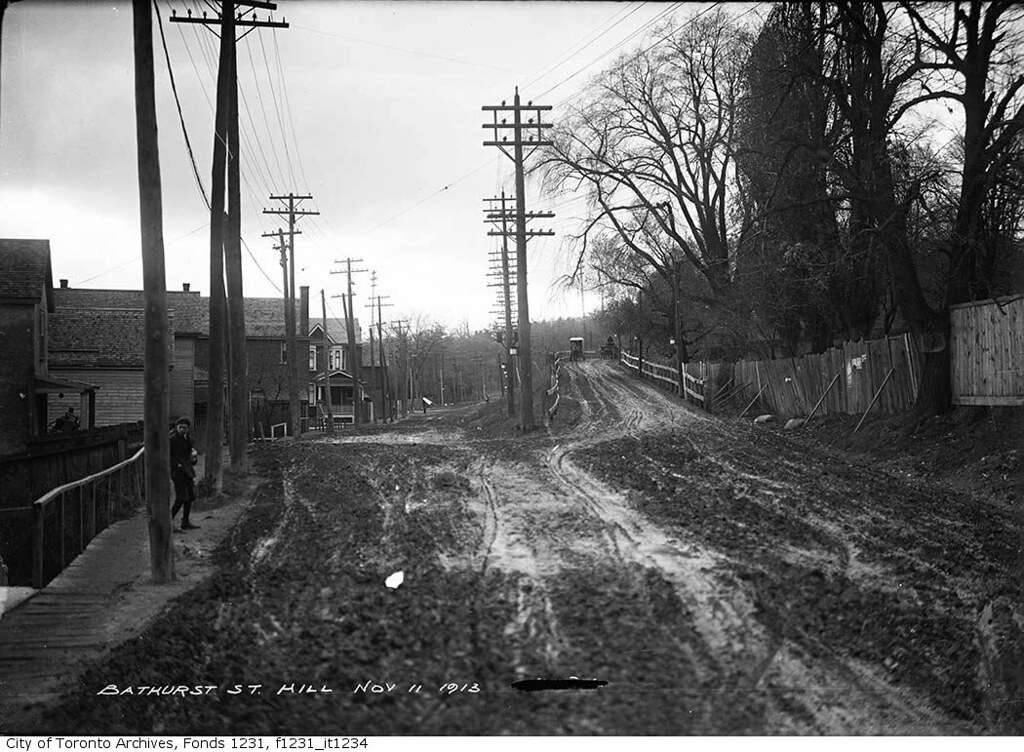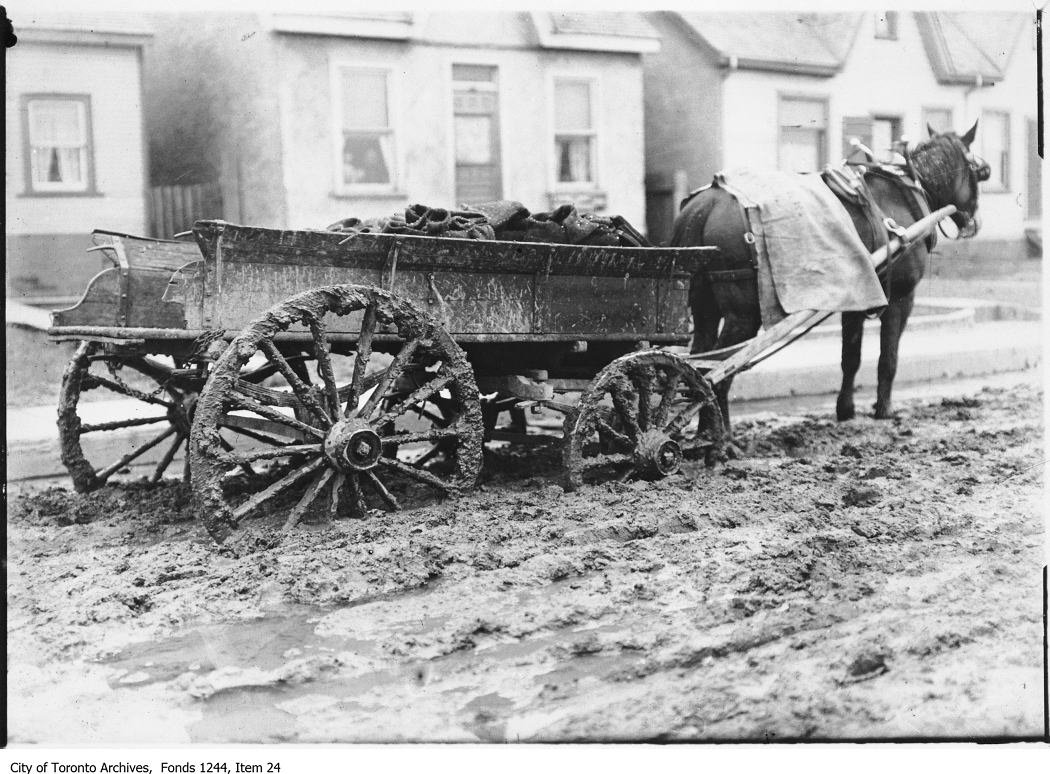Admiral Beez
Superstar
That reminds me of my Gran's place on the Isle of Wight.
|
|
|
Just a little bit of bubble gum pop inspiration, "Bikes Are Freedom" showcases footage over bicycling in over 30 diverse cities around the globe and over a dozen quotes of inspiration of how biking and freedom intermingle for world transportation leaders.
Includes a city named Toronto.
False presumption. We all pay taxes. How about pay for parks?with zero financial contribution by the bike lane users?
So, is the consensus then that bike lane creation and maintenance be funded purely from general city revenue and automobiles, with zero financial contribution by the bike lane users?



The sidewalks were originally installed because the streets in the Town of York, and later the City of Toronto, were unpaved. After any rain, the streets became muddy, hence "Muddy York". The sidewalks was higher than the streets so that people could walk with stepping in mud and horse manure.
The roads were paved because bicycles were getting stuck in the mud. Maybe the motorists should thank the bicyclists for getting the streets paved.
We all pay for sidewalks and roads through our municipal taxes regardless of whether we walk, take transit, cycle or drive. This crap about people not paying their fair share is just that, crap.If more and more people start moving from cars to bikes, should we consider a tax on cyclists to help pay for the infrastructure? I know this will immediately spark comments that cars do not pay their fair share via their taxes, or that bikes should be free because pedestrians do not pay for sidewalks, or that through reducing congestion and pollution plus improving the feel and life of a city bikes should be encouraged and therefore pay nothing (beyond municipal taxes we all pay) toward their required infrastructure, etc, etc. So, is the consensus then that bike lane creation and maintenance be funded purely from general city revenue and automobiles, with zero financial contribution by the bike lane users?
Anne of Green Gables is shooting in town right now.I passed a film shoot the other day on Beverley near Baldwin. I guess the setting was the 19th or early 20th century, because the crew had built a wooden sidewalk and spread dirt in the curb lane to simulate the streetscape of the period.
I know this will immediately spark comments that...bikes should pay nothing (beyond municipal taxes we all pay)
We don't. We count the savings.These replies made me chuckle, as you've all essentially met my post above.
My thinking is that if we have fewer and fewer cars, how do we replace the car-specific tax revenue? That's all.
http://www.smh.com.au/national/bike-riders-save-economy-21-on-each-commute-20130730-2qxdg.htmlThe federal government wants to increase the number of people who make short trips by foot or bicycle after a report card on the performance of Australia's cities found rapid changes in the labour market would pose big challenges to transport infrastructure.
The economy benefits by more than $21 every time a person cycles 20 minutes to work and back and $8.50 each time a person walks 20 minutes to and from work, according to a policy statement released by Deputy Prime Minister Anthony Albanese on Tuesday.

Cyclist ride into Sydney in the morning rush, using the bike lane in King Street. Photo: Peter Rae
Mr Albanese said the construction of walking and riding paths was relatively cheap compared with other modes of transport. A bicycle path costs only about $1.5 million a kilometre to plan and build.
The government has agreed that, where practical, all future urban road projects must include a safe, separated cycle way.

"We need to get more people choosing alternatives to the car": Anthony Albanese. Photo: Nic Walker
"For shorter trips we need to get more people choosing alternatives to the car," Mr Albanese said in a speech. "People will walk or cycle if it's safe and convenient to do so."
The economic benefits of riding and walking to work include better health, less congestion, reduced infrastructure costs, reduced greenhouse gas emissions, better air quality, noise reduction and savings in parking costs.
The government also released the State of Australian Cities 2013 report, which said changing workforce patterns ''would pose major challenges'' for transport infrastructure planning. [...]
https://raisethehammer.org/article/2124/high_quality_cycling_infrastructure_saves_moneyBy Ryan McGreal
Published March 20, 2014
Yesterday, the General Issues Committee unanimously approved the plan to implement a protected two-way cycle track on Cannon Street. Today, talk radio host Scott Thompson posted the following question on twitter:
Should #cyclists pay for using dedicated #bikelanes? #HamOnt #itsonlyfair
Okay, let's take this one step at a time. First of all, we must repeat that drivers do not pay for roads. City streets are funded through the municipal property tax levy, while provincial highways are funded through general revenues (i.e. provincial income tax, corporate tax, and so on).
It's true that drivers specifically pay several taxes and fees, including vehicle tax, gas tax, driver's licence fee, licence plate sticker, and so on. But even if we include all sources of revenue, like speeding tickets and so on, the total amount that drivers specifically pay falls short of the total cost of roads by billions of dollars a year.
(A Conference Board study published last year found that Ontario drivers contribute around $7.7 billion in revenue but the Province and municipalities spend $10-13 billion on roads.)
And that's assuming none of that money goes toward other costs. However, it costs money to maintain the system of drivers' licences and vehicle registrations, which is over and above the cost of roads.
It costs money to maintain police services that enforce the Highway Traffic Act and municipal driving laws - a lot more money than the state collects in tickets, despite motorists grumbling about speed traps.
It costs money to provide medical care to the people who are injured and killed in collisions - around 530 fatalities and 65,000 injuries a year in Ontario. Locally, that translates to around 20 fatalities and 2,250 injuries a year in Hamilton.
It costs money to provide medical care to people who are sickened by air pollution from automobiles. In Hamilton, air pollution is responsible for around 700 hospital visits and 100 premature deaths every year, and half of our air pollution is from automobile exhaust.
So let's put to bed the tired canard that "it's only fair" to start charging cyclists to use the road.[...]
http://www.lunduniversity.lu.se/art...re-expensive-to-travel-by-car-than-by-bicycleWATCH: Six times more expensive to travel by car than by bicycle

(Photo: Lasse Strandberg)
Published: 12/05/2015
It is six times more expensive for society – and for you individually - if you travel by car instead of cycling. This has been shown in a Lund University study of Copenhagen, a city of cyclists. It is the first time a price has been put on car use as compared to cycling.
Video of Six times more expensive to travel by car than by bicycle: study
Watch: Bikes cheaper alternative to cars
In the comparative study, Stefan Gössling from Lund University and Andy S. Choi from the University of Queensland have investigated a cost-benefit analysis that the Copenhagen Municipality uses to determine whether new cycling infrastructure should be built.
It considers how much cars cost society and how they compare to bicycles in terms of air pollution, climate change, travel route, noise, road wear, health and congestion in Copenhagen.
The study concluded that cars have a greater negative impact on the economy than bicycles:
If the costs to society and the costs to private individuals are added together, the impact of the car is EUR 0.50 per kilometre and the impact of the bicycle is EUR 0.08 per kilometre.
The study by Stefan Gössling and his colleague also shows that if we only look at costs/benefits for society, one kilometre by car costs EUR 0.15, whereas society earns EUR 0.16 on every kilometre cycled.
“The cost-benefit analysis in Copenhagen shows that investments in cycling infrastructure and bike-friendly policies are economically sustainable and give high returns”, says Stefan Gössling.
Cost-benefit analysis is a method used to calculate the benefits to society of infrastructure investments.
Publication: ‘Transport transitions in Copenhagen: Comparing the cost of cars and bicycles’
Contact:
Professor Stefan Gössling
Department of Service Management and Service Studies, Lund University
+46 704 922634
stefan.gossling@ism.lu.se
My thinking is that if we have fewer and fewer cars, how do we replace the car-specific tax revenue? That's all.
It's a good question. Is this still in place?I'm not sure there is any car-specific revenue for the City. Perhaps parking tickets and/or street parking permits?




